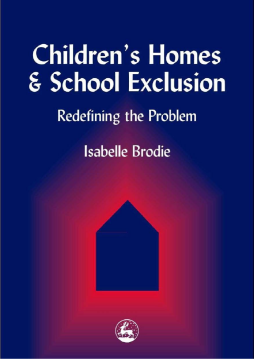
Additional Information
Book Details
Abstract
Based on new, original research, this book highlights the significance of school exclusion as a pivotal process that has long-term negative effects not just on the individuals themselves but also for society as a whole. Drawing on individual accounts, the author demonstrates how aspects of the care system contribute to looked-after children being out of school. Her book explores the reasons for the difficulties they experience, and argues that they need to be differently conceptualised.
By drawing on both the personal accounts of the young people and on evidence gained by interviewing teachers and care professionals, she argues in nine concise chapters that exclusion is a social `process'. She stresses the importance of the young people's relationships with care givers and identifies a problematic gap between the care and education systems which contributes to their ongoing cycle of social exclusion.
This clear and thought-provoking book will prove invaluable to those professionals and students involved in the education of children in care and for policymakers, academics and practitioners working in residential care.
For those professionals who are involved either in developing policy in this area or working on the front line with young people in care, this book is essential reading in order to break through some of the misconceptions held by professionals and offer solutions to this complex problem... She offers a very good analysis of the subject... This book is essential reading to break through some of the misconceptions held by professionals and offer solutions to this complex problem.
Child Abuse Review
Isabelle Brodie is a Research Fellow at the University of Luton. She is co-author, with David Berridge, of Children's Homes Revisited (1998) published by Jessica Kingsley Publishers.
For anyone interested in the education of childen "looked after" in residential care by local authorities, this is a book worth reading. It will also appeal to those who have an interestin the whole area of exclusion and, more broadly, children experiencing difficulties in school... Issues covered by Brodie are of clear relevance to all professionals working with young people in residential care.
Young Minds
Children in public care are 10 times more vulnerable to exclusion than those living with thier families... This timely book offers a sociological and historical analysis of the problem, providing a frame for a detailed qualitative study of 17 boys in residential care who were excluded. All had suffered stressful experiences, including severe abuse, in their family lives and their fragmented care careers had led to many changes of school. The familiar themes of disrupted learning, ill-perepared placements and poor communication recur in their histories.
Isabelle Brodie shows that exclusion is seldom and event but more often a complex process by which a consensus develops among a groups of professionals and carers that the child cannot be contained in mainstream school. well-meaning actions, such as withdrawing children from the classroom when they show signs of stress, maycontribute to the inevitable... This excellent book will be of interest to anyone who is concerned to improve educational opportunities for young people in care and is essential reading for designated teachers and educational psychologists. It offers a valuable insight into the systemic nature of a problem that is too often attributed to the emotional and behavioural difficulties of individual children.
Community Care
Exclusion from school is not a one-off event, but part of a longer process of negative experiences. Isabelle Brodie considers the issues with particular reference to looked-after children.
Church Times
This book offers an interesting and, from a policy perspective, a helpful addition to the growing literatures on exclusion and more generally on the education of children in care.
Social Work Education
